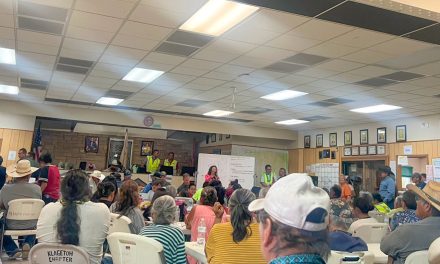
The Inflation Reduction Act: a path to jobs and electrification for tribal communities
By Clara Pratte
Editor’s note: Clara Pratte is the co-founder and board chair at Navajo Power.
For decades, tribal lands, particularly the Navajo Nation, played a pivotal role in powering the West. As our CEO, Brett Isaac, noted in an interview with ABC news recently, cities like Las Vegas and Los Angeles are thriving thanks to power generated on the Navajo Nation using our resources.
Yet, many of our homes beneath these transmission lines still remain without electricity. Even today, estimates are that 20,000 households across Dinétah rely on generators and other inefficient energy sources for basic needs.
At Navajo Power, we are committed to bridging this power gap. Our mission is to develop utility-scale clean energy projects across Indian Country, rectifying a legacy of energy injustice and providing opportunities for tribal communities to thrive. We are closer than ever before to making this goal a reality due to the Inflation Reduction Act, a historic law that is investing in tribal communities while addressing the climate crisis.
In 2022, Vice President Harris cast the decisive vote that sent the Inflation Reduction Act to President Biden’s desk to be signed into law, marking a gigantic leap forward in the fight against climate change. It’s crucial that we build on this momentum in 2025 and beyond.
The Biden-Harris clean energy plan delivers transformational investments to tackle climate change, lower energy costs, and create good-paying jobs that can sustain a family. One of its most impactful initiatives for tribal communities is the Tribal Electrification Program. This program commits $145.5 million to deliver zero-emission electricity to tribal homes, many of which have never had access to reliable power. The program also assists tribal governments with the financial and technical resources needed to transition homes to clean energy systems like solar power.
The Biden-Harris Tribal Electrification Program is not just about electrifying homes—it’s about restoring fairness and equity. Through this program, tribal land residents will experience reduced energy costs, improved air quality, and reliable power.
Thanks to the bold actions of the Biden-Harris Administration, 334,000 new clean energy jobs across the United States have been announced over the past two years alone. With more than $372 billion in private sector investments fueling the construction of new clean energy infrastructure, the outlook for America’s clean energy future has never been more promising. In total, $11.81 billion in federal investments have already created 18,130 jobs across Arizona, further highlighting the transformative impact of these efforts.
At Navajo Power, we are proud to be part of this change. Our company is already making strides towards our mission to connect Navajo families to clean and reliable solar energy. With the Department of Energy awarding our off-grid company, Navajo Power Home, $5 million from the Inflation Reduction Act, we are working to electrify up to 500 off-grid homes each year. This funding allows us to build the capacity within the Navajo Nation to create sustainable energy solutions, tailored by and for the community.
In addition, with the clean energy tax credits and home rebates created by the Biden-Harris Administration, there’s now a clear path toward a future where every home on tribal lands can be powered by resilient, affordable energy.
As we look ahead, the Tribal Electrification Program and the broader objectives of the Inflation Reduction Act bring unprecedented opportunities to our communities. At Navajo Power, we believe that energy independence, powered by clean, renewable resources, is not just a possibility—it’s a necessity.
We must ensure that the progress achieved through the Biden-Harris clean energy law remains intact as we head into this November’s elections.
When it comes to advancing the mission of electrifying tribal lands and pushing forward with clean energy, Vice President Harris is the clear choice. Together, we can light the way for the Navajo Nation and all tribal communities to prosper in the clean energy future.








 Highway 264,
Highway 264, I-40, WB @ Winslow
I-40, WB @ Winslow